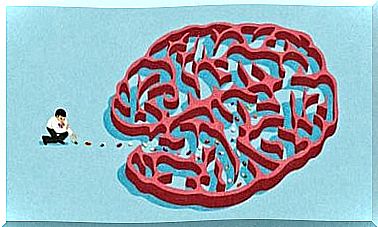How To Know If You Are Addicted To Unhappiness

We all aspire to be happy, but what if in this endeavor we are achieving just the opposite, that is, being unhappy? Unhappiness is more than just the opposite of happiness. It is stagnation, it is anguish and it is the absence of personal strategies to build a fuller, more authentic and meaningful reality.
People are often thought to be motivated to seek pleasure and joy, avoiding pain and grief. Now, if you take a look at who is around you (family, friends, colleagues, neighbors), you will realize that most are “slaves” to their problems.
Faced with this reality, we may ask ourselves the following: why, then, do some when they feel bad do everything possible to improve and others continue to dig into the wound and do nothing to solve the problem? This is a subject that has always interested psychologists, neurologists and sociologists. Let’s see what the experts tell us.
Unhappiness, a very common reality
In 1930 Bertrand Russel published The Conquest of Happiness. Their aim was to try to explain why society seemed to be so miserable and reveal, in turn, what strategies they could follow to work on their well-being. Thus, in the preface to this work, the author points out that the most important thing to overcome unhappiness is to follow our “common sense”.
Now, but what is common sense? We could perhaps understand it, as our internal compass, as that guide that each of us has capable of telling us what we need, why we must fight and what we must avoid. Also Albert Ellis, psychotherapist and creator of rational emotional behavioral therapy points out something similar. According to the famous psychologist, we must try not to betray ourselves, to be loyal to our emotional balance.
Why are there people who “can’t” be happy?
There are experts who talk about addiction to unhappiness, which has to do with insecurity rooted in the person or lack of self-esteem. One, at a given moment, may believe that he is not worthy of happiness and therefore does not fight or fight to change things or his state.
There is a second theory that speaks to the way we were brought up . If in our childhood there has been excessive discipline or unrealistic expectations, we will have assimilated unhappiness as something tolerable, normal and everyday.
Thirdly, it is said that those who have lived through several negative or traumatic experiences in their life unconsciously feel a desire to return to the “status quo” of unhappiness, since that is the only thing they know is that comfort zone.. That is, they do not know what it is to be happy.
Other reasons why a person may be addicted to being unhappy has to do with “taking pride in their realism” in the face of things that happen in life, believing that you only have to focus on the negative and not the positive. They are the type of people who always see the glass as half empty.
The feeling that after a happy moment, disappointment will come
It can also happen that a person is afraid of happiness because they are “sure” that disappointment or sadness will follow after good feelings or joy.
For example, people who do not want to fall in love again because they were so damaged in a previous relationship. They deny themselves happiness for fear of suffering. However, there are some similar cases where a life partner cannot be found for fear of being deceived or abandoned. In addition, this person is likely to spend his life saying how unhappy he is in love.
In turn, many consider that if they are happy they will never achieve their goals, or in other words, without sacrifice there are no gains. Thus, if they have not suffered before getting something they want or if they think they have achieved it in a simple way, they probably detract from what they have achieved, not allowing themselves to enjoy it.
Depression and anxiety, veterans of well-being
Chronic unhappiness can appear in turn when there is a psychological disorder, such as anxiety or depression. An example. In a study carried out at the University of Tokyo by doctors Kawada and Kiratomi, they revealed that dedicating our lives to highly stressful work is undoubtedly one of our biggest causes of unhappiness. These environments are sources of anxiety and depression, two direct factors of emotional distress and distress .

Characteristics of a “chronically unhappy”
This small list will help you to realize if you are addicted to unhappiness or to detect that someone in your environment is. The one who is classified as a chronically unhappy.
Mental and behavioral approaches that cause unhappiness
- Negative thoughts, defeatist approach and lacking motivation.
- Lack of purpose.
- Passive role in life, thinking that our problems are more serious or more difficult to solve than those of the majority.
- Plan goals that are impossible to achieve.
- We do not find that vital impulse with which to recover from adversity.
- Fear of starting new things (meeting people, starting other stages, hobbies, tasks …)
To conclude, beyond what we can think, unhappiness is almost like a virus capable of installing itself in our lives when we least think about it. One way to avoid this is by working on the points indicated. Having purpose, being resilient, daring to innovate in life and setting achievable and motivating goals can generate great and wonderful changes.









